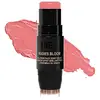What's inside
What's inside
 Key Ingredients
Key Ingredients

 Benefits
Benefits

 Concerns
Concerns

 Ingredients Side-by-side
Ingredients Side-by-side

Polyglyceryl-2 Triisostearate
EmulsifyingHydrogenated Polyisobutene
EmollientPolybutene
Mica
Cosmetic ColorantCeresin
Emulsion StabilisingSynthetic Wax
AbrasiveOctyldodecanol
EmollientMicrocrystalline Wax
Emulsion StabilisingCaprylic/Capric Triglyceride
MaskingDipentaerythrityl Hexahydroxystearate/Hexastearate/Hexarosinate
Skin ConditioningSorbitan Sesquioleate
EmulsifyingPolyhydroxystearic Acid
EmulsifyingEthylene/Propylene Copolymer
AbrasiveEuphorbia Cerifera Wax
Phenoxyethanol
PreservativeGlyceryl Caprylate
EmollientTocopherol
AntioxidantCI 77891
Cosmetic ColorantIron Oxides
CI 19140
Cosmetic ColorantCI 15850
Cosmetic ColorantCI 45410
Cosmetic ColorantCI 42090
Cosmetic ColorantPolyglyceryl-2 Triisostearate, Hydrogenated Polyisobutene, Polybutene, Mica, Ceresin, Synthetic Wax, Octyldodecanol, Microcrystalline Wax, Caprylic/Capric Triglyceride, Dipentaerythrityl Hexahydroxystearate/Hexastearate/Hexarosinate, Sorbitan Sesquioleate, Polyhydroxystearic Acid, Ethylene/Propylene Copolymer, Euphorbia Cerifera Wax, Phenoxyethanol, Glyceryl Caprylate, Tocopherol, CI 77891, Iron Oxides, CI 19140, CI 15850, CI 45410, CI 42090
 Reviews
Reviews

Ingredients Explained
These ingredients are found in both products.
Ingredients higher up in an ingredient list are typically present in a larger amount.
Ci 15850 is the pigment color red. It is an azo dye and created synthetically.
Azo dyes need to be thoroughly purified before use. This allows them to be more stable and longer-lasting.
This ingredient is common in foundations, lipsticks, and blushes. This color is described as brown/orangey red.
It has many secondary names such as Red 6 and Red 7. According to a manufacturer, Red 6 usually contains aluminum.
Learn more about CI 15850CI 19140 is also known as Tartrazine. Tartrazine is a synthetic dye used in cosmetics, foods, and medicine to add a yellow color.
Tartrazine is created from petroleum and is water-soluble.
Some people may experience allergies from this dye, especially asthmatics and those with an aspirin intolerance.
Learn more about CI 19140Ci 42090 is a synthetic dye created from petroleum. It is used to give a bright blue color to cosmetics, medicine, and food.
CI 45410 is a synthetic red-pigment and dye.
It often goes by both Red 28 or Red 27; manufacturers label both ingredients as CI 45410.
This dye is commonly found in makeup because it imparts a vivid color. Some types of this dye change color based on pH level and interaction with moisture:
Your skin has a natural pH of around 4.5 - 5.5.
According to the FDA, CI 45410 is not permitted for use in eye products.
Red 27 is a flourescein dye and commonly used as a fluorescent tracer in medicine.
Learn more about CI 45410Ci 77891 is a white pigment from Titanium dioxide. It is naturally found in minerals such as rutile and ilmenite.
It's main function is to add a white color to cosmetics. It can also be mixed with other colors to create different shades.
Ci 77891 is commonly found in sunscreens due to its ability to block UV rays.
Learn more about CI 77891Octyldodecanol is a fatty alcohol. It is primarily used to enhance the texture of products.
As an emulsifier, Octyldodecanol helps prevent the oils and waters from separating. It also prevents ingredients from creating foam when shaken.
Octyldodecanol is created by reducing fatty acid to an alcohol.
Due to its high molecular weight, it does not get absorbed into the skin.
Learn more about OctyldodecanolSynthetic Wax is created from fossil fuels such as natural gas. It is used to enhance texture, adjust pH, and as an occlusive.
It may also be used as an abrasive ingredient to exfoliate the skin.
Synthetic Wax may not be fungal acne safe.
Learn more about Synthetic WaxEuphorbia Cerifera wax comes from a shrub in Northern Mexico. It is used to stabilize formulations and has emollient properties.
Emollients form a thin layer on top of skin to prevent water from evaporating, keeping skin and lips hydrated.
According to a manufacturer, this wax can range from a yellow/brown color to translucent.
Learn more about Euphorbia Cerifera Wax